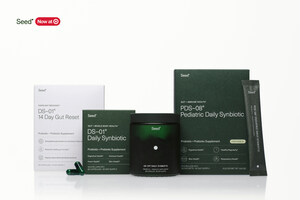LOS ANGELES, Aug. 16, 2021 /PRNewswire/ -- Seed Health announces their next environmental research initiative to study the coral microbiome and the potential of probiotics to conserve, restore and protect coral reefs against the impact of anthropogenic climate change.
Seed Health's ecological research division, SeedLabs, will partner with Dr. Raquel Peixoto to accelerate findings from today's breakthrough publication in Science Advances to develop novel delivery technologies for next generation probiotics with the potential to rescue corals from thermal stress.
"Home to more than 25% of marine life, coral reefs are one of the most biodiverse ecosystems on our planet and play an important role in the health of millions of species, including humans. Rising ocean temperatures and acidification due to greenhouse gas emissions have put coral reefs at risk of worldwide collapse within the next decade," said Raja Dhir, Seed Health co-founder and co-CEO. "As a leading researcher in marine microbiology, Dr. Peixoto and her team are answering critical questions about the potential of probiotics in complex environments like coral reefs, to enhance the resilience of, conserve, restore and protect coral reefs."
Increasing sea surface temperatures and ocean acidification caused by the absorption of increase carbon dioxide (CO2) have disrupted the symbiotic relationship between the coral host and its endosymbiotic algae, the organisms responsible for giving shallow-water corals their color and providing the coral polyp 90% of its energy. Under toxic conditions, the coral polyps expel this vital algae, which results in the whitening of the reef and the death of coral—otherwise known as coral bleaching.
The research published today articulated the first insights into how probiotics—or as described in this study, Beneficial Microorganisms for Corals (BMCs)—trigger a dynamic microbiome restructuring process that can mitigate the damage caused by climate change, pollution, and other human factors. In this study, the coral Mussismilia hispida which were exposed to bleaching conditions and inoculated with BMC saw a 40 percent increase in survival rates compared to coral evaluated in the control group.
"These data reinforce the role that Beneficial Microorganisms for Corals play in increasing the coral host's resistance against environmental threats, while providing new insights into the genetic and metabolic alterations that contribute to coral's survival," said Dr. Peixoto. "I am thrilled to partner with SeedLabs to accelerate the applicability of our research given their domain expertise and thought leadership in probiotics, innovations in delivery technologies, and their international ecosystem of additional research partners."
Since its inception, SeedLabs' research has explored the use of microbes outside the human body, including the first collaboration of its kind that identified the role that probiotics may play in improving immune resilience in honeybees, which can provide protection against the harmful effects of pesticides, climate change and habitat loss.
"With a belief that health is not just human, we are inspired by this newest collaboration with Dr. Peixoto and SeedLabs Fellow, Dr. Helena Villela, to accelerate the viability of coral probiotics at scale," said Ara Katz, Seed Health co-founder and co-CEO. "This initiative reflects our commitment to pioneer probiotic innovations that can rescue and regenerate these critical ecologies impacted by human-induced climate change."
About Seed Health
Seed Health is a microbial sciences company pioneering applications of microbes for human and planetary health. In collaboration with leading academic researchers, we advance breakthrough discoveries in microbial science across a pipeline of novel therapeutics, consumer health innovations and environmental solutions. All consumer innovations in probiotics are commercialized under Seed®. seedhealth.com / seed.com
About SeedLabs
Beyond their broad work across microbiome and human health, Seed Health established SeedLabs in 2018 to develop novel applications of bacteria to enhance biodiversity and recover ecosystems impacted by human activity. The development of probiotics for coral regeneration is its latest initiative, following a probiotic for honey bees (Time's 'Best Inventions,' Fast Company's 'World Changing Ideas'). Other anticipated initiatives in the pipeline will focus on biomaterial development and space and will be announced later this year.
About Dr. Raquel Peixoto
Professor Raquel Peixoto's research has outlined the protocols and proved the concept that the manipulation of coral-associated microorganisms, using Beneficial Microorganisms for Corals (BMCs), is possible and can increase the host's resilience and resistance against environmental threats. This pioneering work has contributed to pave the way for new approaches to reveal and explore mechanisms of marine microbiology and symbiotic interactions. As a Beneficial Microbes for Marine Organisms network (BMMO) founder and chair, her goal is to keep promoting a powerful international platform where basic knowledge can be strengthened and transformed into products to be used for marine ecosystems and sustainable development, as part of her projects on coral reef protection, restoration, and rehabilitation.
Postscript
Anthropogenic climate change is real.
SOURCE Seed Health

Related Links
WANT YOUR COMPANY'S NEWS FEATURED ON PRNEWSWIRE.COM?
Newsrooms &
Influencers
Digital Media
Outlets
Journalists
Opted In





Share this article